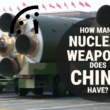Out of the inferno
By Héctor Guerra, August 11, 2014
For decades, human beings have been stuck in the depths of a nuclear weapons hell. But they need not accept this as their abode forever. Just as the poet Dante traversed the inferno on his journey toward heaven, human beings must transit to a new stage in their history—leaving behind weapons of mass destruction that violate the fundamental principles of the UN Charter and international humanitarian law.
In Round Two, Bharat Karnad wrote that "to build a case for disarmament" without considering, among other things, "nations' need to deter wars" through "nuclear military means" is "to seek simplistic solutions to an infernally complex problem." This invites the observation that mankind's dependence on nuclear weapons is morbid. Risky conformism, such as Karnad expresses, exposes human beings to the ever-present possibility of obliteration. Work toward general disarmament represents a struggle against such determinism. Again, Dante traversed the inferno. He did not remain there.
Same end, new means. The disarmament movement has not yet accomplished its ultimate goal. But it is important to bear in mind what has already been achieved in curbing the expansion of nuclear arsenals and promoting their eradication. Nuclear testing has all but ended; proliferation has been seriously curtailed; nuclear-weapon-free zones cover vast expanses of the world. Still, though these are successes, they are not an end in themselves. They are the means to an end—returning the world to the nuclear-free condition that it enjoyed for all of history until the last seven decades.
To promote disarmament as the 21st century unfolds, new means are needed. The international system has changed since 1945, when the first nuclear test was conducted; since 1970, when the Nuclear Non-Proliferation Treaty entered into force; and since 1991, when the Cold War ended. New challenges exist today—and new possibilities too. The humanitarian initiative toward nuclear disarmament is one such possibility.
The initiative is no dogmatic construct that its adherents can seek to impose on others. Rather, it is a collective process that draws on a wide range of voices from government, multilateral organizations, civil society, academia, and elsewhere. It is maturing apace but remains very much under construction. Participants in the initiative agree on certain issues and debate others intensely, but this spirit of free exchange is one of the initiative's strengths and ought to be retained. For if the initiative is to bear fruit, the movement must reach out not only to like-minded individuals but also to skeptics and to those currently uninterested in disarmament.
The work that lies ahead, though it will be intensive, is promising. Human beings are a flawed species but remain full of potential, including the potential to promote human development and true security through the elimination of apocalyptic weapons. Then again, even disarmament is a means, not an end. The ultimate goals, as expressed in the UN Charter, include saving future generations from the scourge of war and reaffirming faith in fundamental human rights.
Topics: Nuclear Weapons
Share: [addthis tool="addthis_inline_share_toolbox"]














